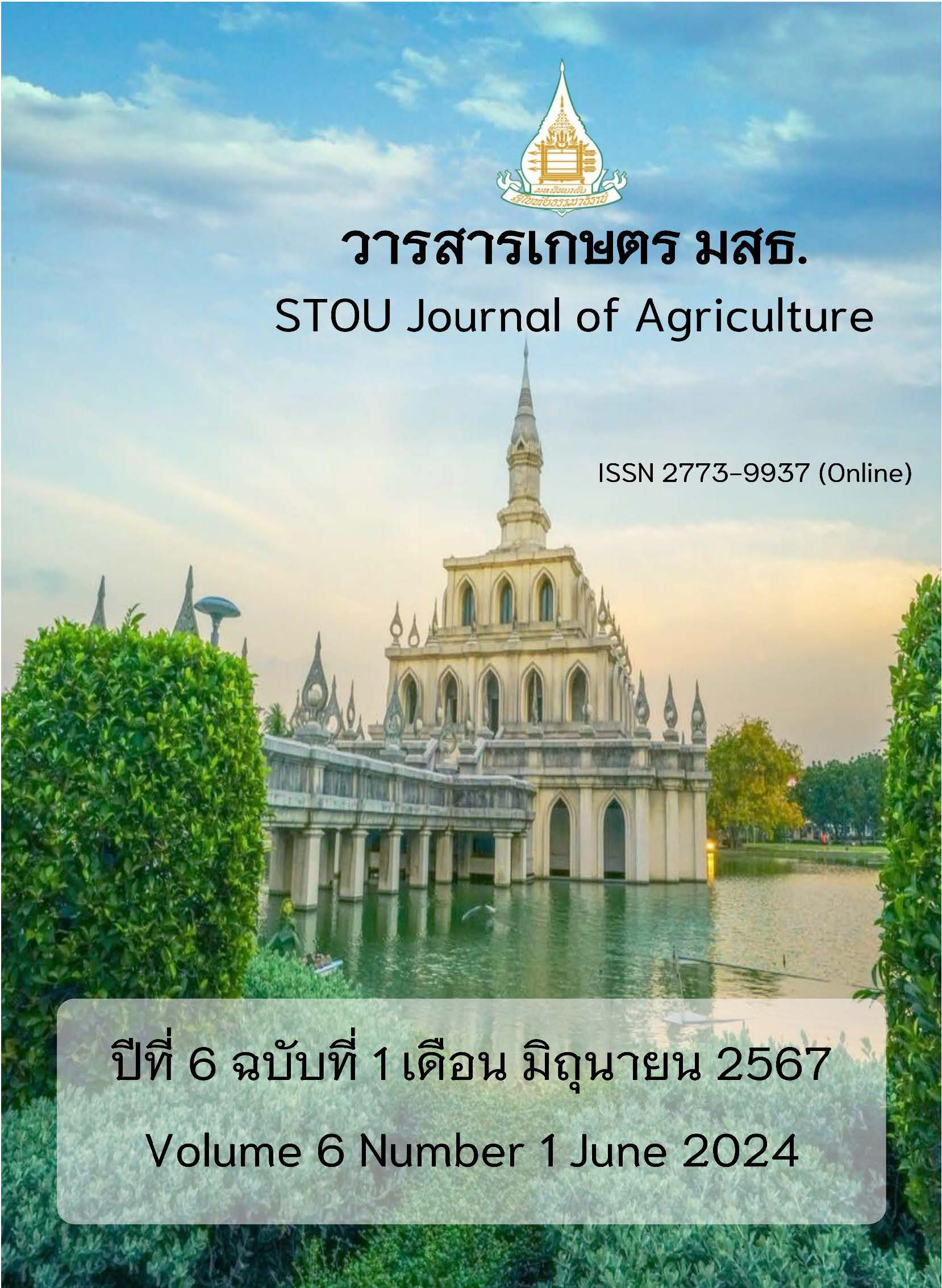ศักยภาพเกษตรกรสูงวัยเพื่อการส่งเสริมงานเคหกิจเกษตร
Main Article Content
บทคัดย่อ
การวิจัยนี้มีวัตถุประสงคเพื่อศึกษา 1) ข้อมูลทั่วไป 2) ความรู้ฝงลึก 3) ศักยภาพของเกษตรกรสูงวัย และ 4) การนำศักยภาพของเกษตรสูงวัยเพื่อส่งเสริมงานเคหกิจเกษตร การวิจัยนี้ใช้การวิจัยเชิงคุณภาพ โดยการสัมภาษณ์ การสังเกตและการสนทนากลุ่มผู้ให้ข้อมูลหลักคือ เกษตรกรสูงวัย ใช้วิธีการเลือกประชากรแบบเฉพาะเจาะจง จากผู้ที่เขาร่วมโครงการส่งเสริมเคหกิจเกษตรในครัวเรือนเกษตรสูงวัย ตัวแทนภูมิภาคๆ ละ 1 จังหวัด จำนวน 6 จังหวัด จังหวัดละ 10 ราย รวมจำนวน 60 ราย วิเคราะห์ข้อมูลโดยการวิเคราะห์เชิงเนื้อหา ผลการวิจัยพบว่า 1) เกษตรกรสูงวัยผู้ใหขอมูลหลักสวนใหญ่เป็นเพศหญิง มีทั้งที่ทำการเกษตรหลังจากเกษียณจากงานประจำ และทำการเกษตรมาแต่เดิม ทำการเกษตรแบบผสมผสาน ปลูกพืชหลากหลายชนิดเลี้ยงสัตว์ เช่น ไก่ เป็ด วัว ควาย และปลา เป็นต้น และการปลูกพืชสวนครัวเช่น ขิง ข่า ตะไคร้ พริก โหระพา มะนาว และกะเพรา เป็นต้น พื้นที่ที่ทำการเกษตรมีขนาดไม่ใหญ่ สวนใหญ่ทำการเกษตรเพื่อบริโภคในครัวเรือน แจกจ่ายเพื่อนบ้านและเหลือข่ายเพื่อเป็นรายได้เสริมโดยไม่มีการทำบัญชี ทําการเกษตรเป็นแบบดั้งเดิมและผสมกับการใชเครื่องทุ่นแรง 2) ความรู้ฝงลึกเป็นความรู้ที่นำมาใช้ทำกิจกรรมที่วางจากการทําการเกษตร เช่น การทํางานฝมือ งานหัตถกรรมและแปรรูปจากพืชผลการเกษตร เป็นต้น มีความสามารถพิเศษ เช่น การทําอาหารท้องถิ่น การทำขนมไทย การแปรรูปจากพืชผลการเกษตร การทํางานฝีมือ และงานศิลปหัตถกรรม เป็นต้น มีความคิดสร้างสรรค ประดิษฐ์งานศิลปหัตถกรรม งานฝีมือต่างๆ ตามบริบททองถิ่น เช่น ลายพวงมะโหตร ลายผาทอ ลายผาบาติก ลายถัก เครื่องจักสาน สูตรสมุนไพรลูกประคบจากสมุนไพรทองถิ่น และสูตรอาหารจากพืชผลการเกษตร เป็นต้น มีความยินดีจะถ่ายทอดให้ผู้อื่น และเข้าร่วมทำกิจกรรมกลุ่มด้วยความเต็มใจ ให้ความสำคัญต่อการรวมกลุ่ม ยินดีใหความร่วมมือในทุกๆ กิจกรรม รวมทั้งการเป็นจิตอาสาบําเพ็ญประโยชนต่อชุมชน 3) เกษตรกรสูงวัยมีศักยภาพตามองค์ประกอบสมรรถนะ 5 ด้าน เป็นดังนี้ (1) ด้านแรงจูงใจ คือต้องการลดค่าใช้จ่ายในครัวเรือน ใช้พื้นที่ให้เป็นประโยชน์ สืบทอดจากบรรพบุรุษและดำเนินตามแนวคิดเศรษฐกิจพอเพียง (2) ด้านคุณลักษณะเฉพาะ ไม่ย่อท้อต่อปัญหา คิดเชิงบวก ยอมรับการเปลี่ยนแปลง (3) ดานอัตมโนทัศน์จะเปิดรับข้อมูล พร้อมพัฒนาตนเองให้ความร่วมมือกับส่วนรวม พร้อมที่จะเป็นผู้ให้และสร้างประโยชน์ต่อชุมชน (4) ด้านความรู้เป็นผู้มีองค์ความรู้ในตน ค้นหาความรู้เพิ่มเติมจากสื่อรอบตัวหรือเจ้าหนาที่ หน่วยงานของรัฐเพื่อพัฒนาตนเองใหตนเองมีคุณคาไม่ตองพึ่งพาคนอื่น และ (5) ด้านทักษะ มีทักษะพื้นฐานซึ่งสืบทอด มาจากบรรพบุรุษ สามารถใช้อุปกรณ์การเกษตรพื้นฐานและขยายพันธุพืชได้ และ 4) ความรู้ฝังลึกและศักยภาพของเกษตรกรสูงวัย อันทรงคุณค่าทั้งแนวคิดและการปฏิบัติ การส่งเสริมงานเคหกิจเกษตรจึงควรใช้กระบวนการจัดการความรู้ในชุมชนแบบมีส่วนร่วมในการจัดการสุขภาวะที่ดีในครัวเรือนและสิ่งแวดล้อมให้เหมาะสมสำหรับเกษตรกรสูงวัย การปรับปรุงสภาพแวดล้อมในการทำงาน และการส่งเสริมเพิ่มรายได้จาการแปรรูปผลผลิตทางการเกษตร เพื่อต่อยอดและสืบสานสู่รุ่นต่อ ๆ ไป
Article Details

อนุญาตภายใต้เงื่อนไข Creative Commons Attribution-NonCommercial-NoDerivatives 4.0 International License.
บทความที่ได้รับการตีพิมพ์เป็นลิขสิทธฺ์ของวารสารเกษตร มสธ.
ข้อความที่ปรากฎใน
เอกสารอ้างอิง
กนกอร ปราชญ์นคร. (2550). การพัฒนาหลักสูตรอบรมเสริมสร้างสมรรถนะข้าราชการประจำศูนย์ปฏิบัติการต่อสู้เอาชนะยาเสพติดจังหวัด. วิทยานิพนธ์ปริญญาการศึกษาดุษฎีบัณฑิต. สาขาการศึกษาผู้ใหญ่ มหาวิทยาลัยศรีนครินทรวิโรฒ.
ณรงค์วิทย์ แสนทอง. (2550). มารู้จัก Competency กันเถอะ (พิมพ์ครั้งที่ 3). บริษัท เอช อาร์ เซ็นเตอร์ จำกัด.
นิสดารก์ เวชยานนท์. (2549). Competency-based approach. กรุงเทพมหานคร: กราฟิโกซิสเต็มส์.
พิชัย อุ่นนันกาศ. (2552). ความสัมพันธ์ระหว่างการรับรู้รูปแบบภาวะผู้นำของผู้บังคับบัญชากับความผูกพันต่อองค์กรของพนักงาน บริษัท ลัคกี้ยูเนี่ยนฟู้ดส์ จำกัด. วิทยานิพนธ์ รัฐประศาสนศาสตรมหาบัณฑิต มหาวิทยาลัยเชียงใหม่.
มยุรี กมลบุตร. (2556). การพัฒนาสมรรถนะของผู้บริหารการพยาบาลระดับต้น โรงพยาบาลสังกัดกระทรวงสาธารณสุข. ดุษฎีนิพนธ์ ปริญญาปรัชญาดุษฎีบัณฑิต มหาวิทยาลัยรามคำแหง.
รัตติกรณ์ จงวิศาล. (2551). ภาวะผู้นำของผู้ประกอบการความสัมพันธ์เชิงโครงสร้างระหว่างคุณลักษณะทางจิตวิทยาการทำงานเป็นทีม และความสำเร็จในการประกอบธุรกิจ. วิทยานิพนธ์ศึกษาศาสตรบัณฑิต สาขามนุษยศาสตร์และสังคมศาสตร์ สาขาเศรษฐศาสตร์และบริหารธุรกิจ สาขาส่งเสริมการเกษตรและคหกรมศาสตร์ มหาวิทยาลัยเกษตรศาสตร์.
วรารัตน์ เขียวไพรี. (2550). การพัฒนาทรัพยากรมนุษย์ (Human Resource Development: HRD). กรุงเทพฯ: สิรบุตรการพิมพ์.
วิชัย วงษ์ใหญ่. (2552). ความรู้. สารานุกรมวิชาชีพครู เฉลิมพระเกียรติ พระบาทสมเด็จพระเจ้าอยู่หัวเนื่องในโอกาส มหามงคลเฉลิมพระชนมพรรษา 80 พรรษา. กรุงเทพฯ: สำนักงานเลขาธิการคุรุสภา. หน้า 181-184
สุกัญญา รัศมีธรรมโชติ. (2549). แนวทางการพัฒนาศักยภาพมนุษย์ด้วย Competency (พิมพ์ครั้งที่ 3).กรุงเทพมหานคร: สำนักพิมพ์ซีเอ็ดยูเคชั่น.
สำนักงานคณะกรรมการข้าราชการพลเรือน. (2552). คู่มือสมรรถนะหลัก คำอธิบาย และพฤติกรรมบ่งชี้. กรุงเทพฯ สำนักงานคณะกรรมการข้าราชการพลเรือน.
สำนักงานสถิติแห่งชาติ. (2562). จำนวนประชากรจากการทะเบียน จำแนกตามกลุ่มอายุ รายจังหวัดและภาค พ.ศ. 2553-2562 สืบค้นจาก http://statbbi.nso.go.th/staticcreport/page/section/th/01.aspx
อาภรณ์ ภู่วิทยพันธุ์. (2551). พจนานุกรรมพฤติกรรมความสามารถ (พิมพ์ครั้งที่ 2). บริษัท เอช อาร์ เซ็นเตอร์จำกัด
อาภรณ์ ภู่วิทยพันธุ์. (2554). เทคนิคการจัดทำแผนการสื่อสารงาน HR. กรุงเทพฯ: พิมพ์ดีการพิมพ์.
DeSimone, R. L. & Harris, D. M. 1998. Human Resource Development. 2nd ed. Fort Worth: The Dryden Press, Harcourt Brace College.
Durand, D.E. (1975). Factors of Achievement motivation and Skill training on the Entrepreneurial behavior of black businessmen. Organizational Behavior and Human Performance, 14(1) 76-90
Green, C. P. (1999). Building Robust Competencies: Linking Human Resource System To Organization Strategies. San Francisco: Jossey Bass.
Hamel, M.T. & Prahalad, C.K. (1994). Competing for the Future Massachusetts: Boston, Harvard Business School Press.
Joy-Matthews, J., Megginson, D., & Surtees, M. (2008). Human Resource Development.
Kathleen, L. M. (1990). Special training for special needs: A competency-based training program for personnel working with your children who have special needs. Boston: Allyn and Bacon.
Klapalová, A. (2013). Knowledge, Skills and Competencies of Hospitality Companies in the South Moravian Region. Journal of Competitiveness, 5(2).
Mankin, D. 2009. Human Resource Development, New York : Oxford University Press.


